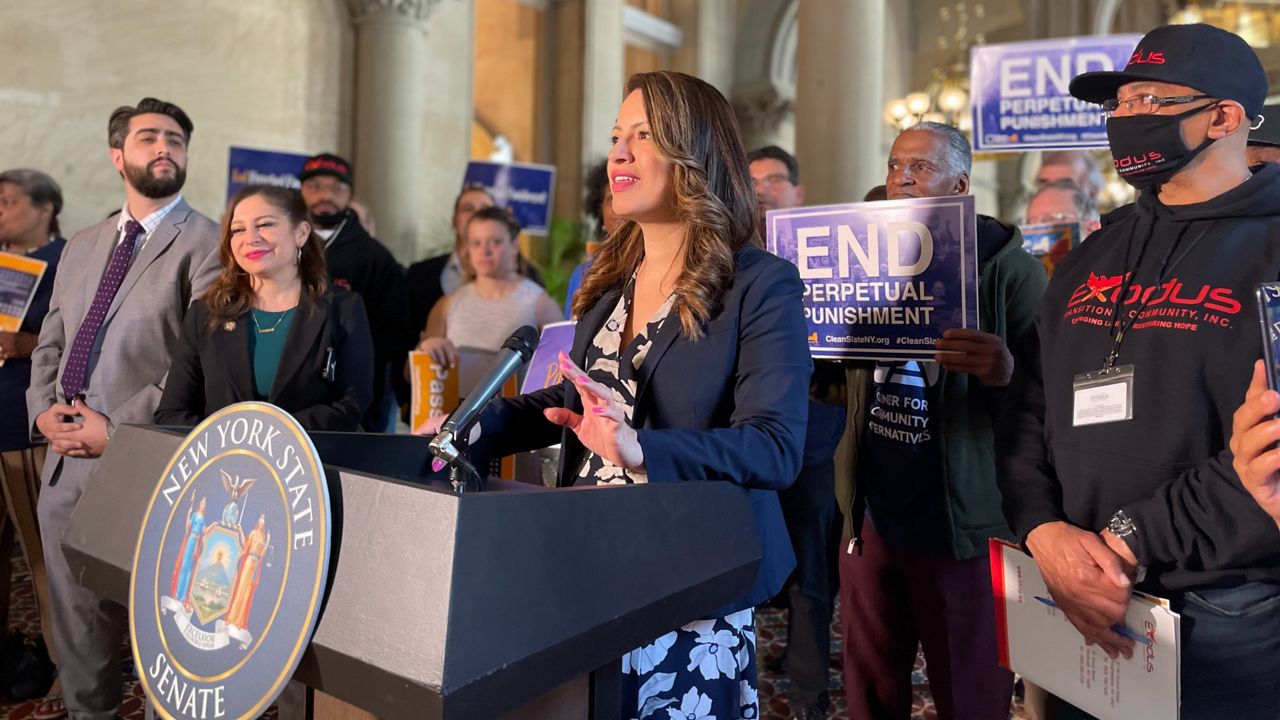The fate of the Clean Slate Act, which would seal millions of New Yorkers' criminal records, rests with Assembly leadership, but chances of passage appeared bleak Friday night.
Assemblymembers said they have the votes to pass the bill that would to seal a person's criminal records three years after sentencing for misdemeanors and seven years for felonies. It would not apply to sex crimes.
But it's up to Assembly Speaker Carl Heastie, a Bronx Democrat, to bring the bill to the floor for a vote before members leave Albany for the year.
"This is fully at the feet of the Assembly Speaker Carl Heastie," said Katie Schaffer, Center for Community Alternatives director of advocacy and organizing. "The bill has all of the support that it needs to pass and people across the state, groups across the state, companies across the state, the 2.3 million New Yorkers impacted by this system are calling on the speaker to bring the bill to the floor for a vote. This is really on him at this point."
Representatives with Heastie's office did not respond to a request for comment regarding the status of the Clean Slate Act.
Lawmakers in the Assembly continued to work, negotiating and passing legislation through Friday, and were expected to continue through early Saturday morning.
Multiple Assemblymembers declined, or could not give an update, on the bill's fate for most of the day.
Sponsor Catalina Cruz, a Democrat from Queens, said she had submitted all materials and information about the measure to Assembly leadership.
"I've turned in all I can," she said while leaving the chamber Friday afternoon.
Session was scheduled to end for the year after Thursday. Senators, who passed Clean Slate on Wednesday, finished legislative business just before the sun rose Friday morning.
The state Education Department, county clerks and New York's Catholic Conference have expressed concerns with the measure in the last several days.
The New York State Association of County Clerks released a memo to lawmakers late Thursday detailing their issues with the proposed bill.
Putnam County Clerk Michael Bartolotti, the association president, said Friday a county clerk maintains a county's court records that deal with felony criminal matters. County court records are often kept in the county clerk's office.
"If someone requests those, we would be the one that would comply or reject the request," Bartolotti said Friday.
County clerks will lack proper knowledge or judgment to determine what record should be sealed under Clean Slate if it were signed into law, he added.
"Looking at the mechanics of how the bill is written, we wouldn't have control over what gets sealed or what doesn't," Bartolotti said. "If there was a ministerial error somewhere along the line, we could be held personally liable for punitive damages. From our perspective, that is our No. 1 concern."
The association, which represents the state's 62 county clerks, distributed the memo to lawmakers for the first time Thursday night. Clerks have communicated concerns about Clean Slate to lawmakers and other stakeholders throughout scheduled session.
The Clean Slate Act was amended over the weekend to allow government entities authorized or mandated to fingerprint employees for jobs involving children and vulnerable populations access to sealed records. The bill was changed after law enforcement and other state agencies expressed various issues with the automatic sealing of records after a set time period.
The state Catholic Conference argued the changes were insufficient in a new memo of concern about the Clean Slate Act redistributed to lawmakers late Thursday, saying the language mentions government entities or employers authorized to fingerprint, but does not include the state's 1,500 Catholic parishes or 400 schools the conference represents.
"We background check everyone who works with children in our parishes and in our schools and in all charitable organizations, but they're not fingerprint-based," Catholic Conference Executive Director Dennis Poust said Friday. "So we woud be shut out of getting the information a public school or government agency might be able to get.
"It's an issue for us," Poust added. "Obviously, we've learned a lot of hard lessons with the sexual abuse scandals, and we successfully have become a very, very safe place for children, and we want to keep it that way."
Bartolotti and Poust said their organizations would support Clean Slate with the appropriate amendments.
Lawmakers and the Education Department reached an agreement on Clean Slate late Thursday after meeting for several hours. The Education Department came out in favor of the bill Friday.
"The Department worked with the bill sponsors to come to a successful resolution that ensures appropriate NYSED staff will be permitted to access and base decisions on criminal history information related to applicants for employment clearance, certification, licensure and those licensees under investigation for alleged violations or harm to the public," SED officials said in a statement Friday. "We thank Assemblymember Cruz and Senator Myrie for their collegiality and support the bill with these changes."
Republicans stand united against the measure, saying it will remove necessary consequences for offenders and lead to higher crime rates.
"We have to be selective in that and make sure that the person who is getting that second chance understands the value of it," said Assemblyman Mike Reilly, a Republican from Staten Island. "When you just do it as a blanket policy automatically within a three-year period for prior conviction of a misdemeanor or seven years for prior conviction of a felony then you're not making sure the people that are getting that clean slate truly earned it and understand it and value it."



